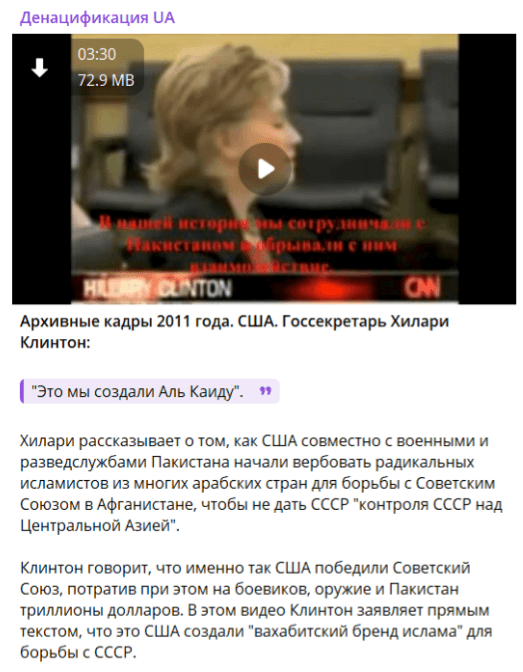Verification within Meta’s Third-Party Fact-Checking Program
Information is being spread online claiming that in 2011, Hillary Clinton stated that the USA created the terrorist organization Al-Qaeda.
However, this is false. Hillary Clinton did not say that the USA created Al-Qaeda; the authors provided an incorrect translation of her words.
Screenshot of the post
Al-Qaeda is an international jihadist terrorist organization founded in Afghanistan in 1988 by Osama bin Laden to fight against Soviet occupation forces in the country. After the withdrawal of Soviet troops from Afghanistan in 1989, Al-Qaeda expanded its fight against proponents of the Western way of life in Muslim countries, as well as against Western states, publicly declaring war on the USA in 1996. Throughout its existence, the group has carried out and claimed responsibility for a number of terrorist attacks, including the September 11, 2001, attacks in the United States. The organization has branches in the Middle East, Africa, and Asia, where its main forces are concentrated.
In the posts, users refer to three video clips featuring Hillary Clinton, in which the then-Secretary of State supposedly claims that the United States created Al-Qaeda. By searching with keywords, we found the indicated videos and transcripts of speeches and interviews — these materials were published in 2009, 2010, and 2011. However, none of the clips contain such a quote.
In the first video from 2009, where Clinton comments on the situation in Pakistan, the phrase “the people we are fighting today, we funded 20 years ago” was translated as “we created these people 20 years ago, whom we are now fighting,” although she was actually referring to funding (“fund”) rather than creation (“found”). The video authors used the similarity in the sounds of the two words to distort the meaning of Hillary Clinton’s statement.
Also, this speech was not about Al-Qaeda. In fact, the then-Secretary of State was talking about Pakistan’s inability to deal with the Taliban — an organization composed of various Islamist armed groups operating in Afghanistan and Pakistan. This statement was made in the context of news that the Taliban had advanced closer to Pakistan’s capital, Islamabad, in attempts to capture it. Clinton noted that the United States was partly to blame because the U.S. government had previously funded people who fought against Soviet troops and later became part of the Taliban:
“… let’s remember here, the people we are fighting today, we funded 20 years ago. And we did it because we were locked in this struggle with the Soviet Union. They invaded Afghanistan and we did not want to see them control Central Asia. … And it was President Reagan in partnership with the Congress led by Democrats who said: “You know what? Sounds like a pretty good idea. Let’s deal with the ISI and the Pakistani military and let’s go recruit these mujahedeen. And that’s great. Let’s get some to come from Saudi Arabia and other places importing their Wahhabi brand of Islam so that we can go beat the Soviet Union.”
And guess what? They [USSR] retreated. They lost billions of dollars and it led to the collapse of the Soviet Union. So there is a very strong argument which is it wasn’t a bad investment to end the Soviet Union, but let’s be careful what we sow because we will harvest. So we then left Pakistan. We said, “OK, fine. You deal with the stingers we’ve left all over your country. You deal with the mines that are along the border. And, by the way, we don’t want to have anything to do with you. In fact, we’re sanctioning you.” So we stopped dealing with the Pakistani military and with ISI, and we now are making up for a lot of lost time.”
Although the US government did not create al-Qaeda, it did finance, in particular, the Afghan-Pakistani Haqqani group, which during the war in Afghanistan fought against the occupation of the country by the Soviet Union. The group is closely linked to al-Qaeda and helped found it. However, there is no evidence that the US has purposefully created any terrorist groups.
Attention
The authors do not work for, consult to, own shares in or receive funding from any company or organization that would benefit from this article, and have no relevant affiliations


